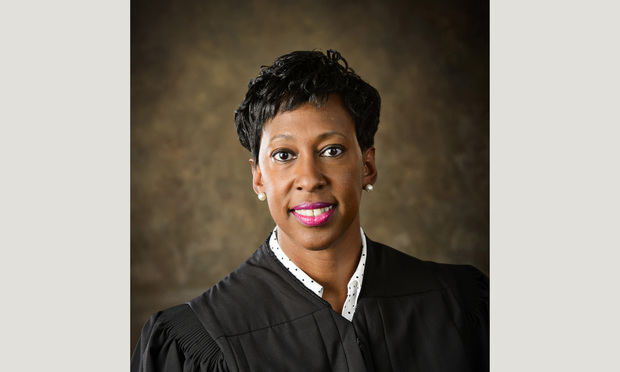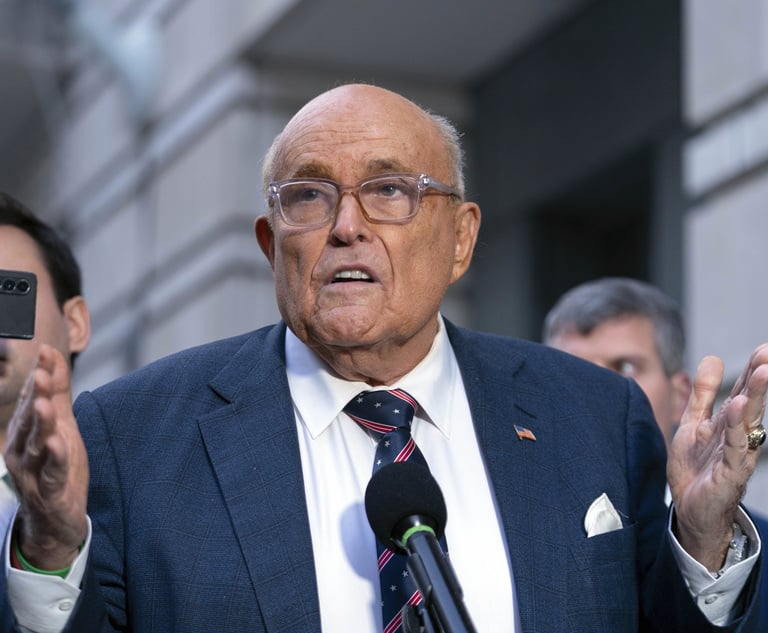Georgia Appeals Court Revives $1.7M of Legal Malpractice Verdict Against Alston & Bird
The appeals court found the trial judge inappropriately apportioned the award to a nonparty.
May 22, 2020 at 03:27 PM
6 minute read
The original version of this story was published on Daily Report
 Superior Court Judge Verda M. Colvin of the Macon Judicial Circuit/courtesy photo
Superior Court Judge Verda M. Colvin of the Macon Judicial Circuit/courtesy photo
The Georgia Court of Appeals reinstated the bulk a $2 million legal malpractice verdict against Alston & Bird, ruling the trial judge should not have reduced it to less than $700,000 to reflect the 60% of fault a jury assigned to a nonparty.
The opinion leaves Alston & Bird on the hook for about $1.7 million, including post-apportioned damages of more than $640,000 and $1.1 million in attorney fees. But the appeals court tossed more than $340,000 in prejudgment interest the jury awarded.
The opinion arises in part from an earlier Court of Appeals ruling in which the court allowed the nonparty—a former Alston client—to be added to the jury form over the plaintiffs' objections.
Thursday's ruling was penned by one of the court's newest members, Judge Verda Colvin, a former assistant U.S. attorney in Georgia's Middle District who was appointed to the court by Gov. Brian Kemp last month.
The convoluted dispute began when Maury Hatcher, the former manager of family-owned business Hatcher Management, was accused of looting the company and fleeing to Florida with more than $1.2 million in ill-gotten gains. The company sued Hatcher and won a $4 million judgment that remains unpaid.
The company sued Alston & Bird in 2012 for legal malpractice and breach of fiduciary duty, claiming former partner Jack Sawyer knew Hatcher was looting the business, and failed to inform the family members about their right to review and receive company disbursements, among other claims.
Alston filed a notice of nonparty fault seeking to add Hatcher and his siblings, Jerry and Barry Hatcher, to the case. Fulton County Superior Court Judge Craig Schwall refused to do so.
The Court of Appeals reversed Schwall in 2016, citing the Georgia Supreme Court's 2015 decision in Zaldivar v. Prickett.
That decision said the 2005 apportionment statute "requires the trier of fact in some cases to divide responsibility for an injury among all of those who 'contributed to' it—parties and nonparties alike—according to their respective shares of the combined 'fault' that produced the injury."
The case went to trial in 2018, and the jury awarded the company more than $2.1 million, including $697,614 in damages, attorney fees and expenses of $1,096,561 and prejudgment interest of $341,831.
The panel apportioned 60% of the fault to Maury Hatcher, 32% to Alston and 8% to the plaintiff, Hatcher Management.
Alston's lawyers, Robbins Ross Alloy Belinfante Littlefield partners Richard Robbins, Jason Alloy and Jeremy Littlefield, told Schwall he should reduce the entire verdict against the firm by 68%, per the jury's apportionment of fault.
Hatcher's lawyers, Harmon Caldwell Jr., Harry MacDougald, Jeremy Moeser and Christine Dial of Caldwell, Propst & DeLoach, argued that only the 8% apportioned to their client should be subtracted and the rest levied against Alston.
After briefings and a hearing, Schwall ultimately sided with Alston, awarding $683,522 to Hatcher. Both sides appealed.
Colvin's May 21 order, written with the concurrence of Judges Yvette Miller and Clyde Reese, said Schwall erred in allowing the jury to award prejudgment interest.
Relevant Georgia law only allows such interest to be assessed in breach-of-contract claims, Colvin wrote, and Hatcher asserted no such claim against Alston in its complaint.
Thus, "we must conclude that the trial court erred when it authorized the recovery of prejudgment interest here," Colvin said.
But Alston's assertion that it was not responsible for the 60% of the judgment apportioned to Maury Hatcher was also incorrect, she said.
Pointing to the court's earlier opinion in the case, Colvin said the law draws a distinction between the apportionment of fault to a plaintiff and of damages levied against a defendant in a case in which a nonparty is also blamed.
The law states that a trial court "shall reduce the amount of damages otherwise awarded to the plaintiff in proportion to his or her percentage of fault," wrote Colvin.
As the court has ruled in an earlier case, "we made clear that [the apportionment statute] does not authorize a jury to apportion damages against a nonparty," the opinion said.
"Here, the jury awarded compensatory damages in the amount of $697,614," Colvin wrote. "Because this is an action involving only one defendant, and because the jury found that [Hatcher] was 8% responsible for the injuries it suffered, the trial court should have reduced this award of compensatory damages by 8% rather than 68%."
Similarly, she said, the award of attorney fees should not have been reduced because the jury specifically found that Alston acted in "bad faith."
"Given that the court's 68% reduction in the award resulted in a final judgment of $683,522.07—less than the jury's award of fees and costs alone—it is clear that the trial court included the fee award as part of 'all damages awarded by the jury,'" Colvin wrote.
There was "nothing in the jury's verdict to indicate that there was any allocation of bad faith to anyone other than Alston & Bird," she said, and thus those fees should not have been reduced.
Alston's lawyers referred a query to the firm's managing partner, Steve Collins, who did not respond to requests for comment. Hatcher's attorneys also did not respond to queries.
This content has been archived. It is available through our partners, LexisNexis® and Bloomberg Law.
To view this content, please continue to their sites.
Not a Lexis Subscriber?
Subscribe Now
Not a Bloomberg Law Subscriber?
Subscribe Now
NOT FOR REPRINT
© 2025 ALM Global, LLC, All Rights Reserved. Request academic re-use from www.copyright.com. All other uses, submit a request to [email protected]. For more information visit Asset & Logo Licensing.
You Might Like
View All
Litigators of the Week: A $630M Antitrust Settlement for Automotive Software Vendors—$140M More Than Alleged Overcharges

A Second Straight Year of Increased Securities Filings—With Perhaps More on the Horizon
Trending Stories
- 1Uber Files RICO Suit Against Plaintiff-Side Firms Alleging Fraudulent Injury Claims
- 2The Law Firm Disrupted: Scrutinizing the Elephant More Than the Mouse
- 3Inherent Diminished Value Damages Unavailable to 3rd-Party Claimants, Court Says
- 4Pa. Defense Firm Sued by Client Over Ex-Eagles Player's $43.5M Med Mal Win
- 5Losses Mount at Morris Manning, but Departing Ex-Chair Stays Bullish About His Old Firm's Future
Who Got The Work
J. Brugh Lower of Gibbons has entered an appearance for industrial equipment supplier Devco Corporation in a pending trademark infringement lawsuit. The suit, accusing the defendant of selling knock-off Graco products, was filed Dec. 18 in New Jersey District Court by Rivkin Radler on behalf of Graco Inc. and Graco Minnesota. The case, assigned to U.S. District Judge Zahid N. Quraishi, is 3:24-cv-11294, Graco Inc. et al v. Devco Corporation.
Who Got The Work
Rebecca Maller-Stein and Kent A. Yalowitz of Arnold & Porter Kaye Scholer have entered their appearances for Hanaco Venture Capital and its executives, Lior Prosor and David Frankel, in a pending securities lawsuit. The action, filed on Dec. 24 in New York Southern District Court by Zell, Aron & Co. on behalf of Goldeneye Advisors, accuses the defendants of negligently and fraudulently managing the plaintiff's $1 million investment. The case, assigned to U.S. District Judge Vernon S. Broderick, is 1:24-cv-09918, Goldeneye Advisors, LLC v. Hanaco Venture Capital, Ltd. et al.
Who Got The Work
Attorneys from A&O Shearman has stepped in as defense counsel for Toronto-Dominion Bank and other defendants in a pending securities class action. The suit, filed Dec. 11 in New York Southern District Court by Bleichmar Fonti & Auld, accuses the defendants of concealing the bank's 'pervasive' deficiencies in regards to its compliance with the Bank Secrecy Act and the quality of its anti-money laundering controls. The case, assigned to U.S. District Judge Arun Subramanian, is 1:24-cv-09445, Gonzalez v. The Toronto-Dominion Bank et al.
Who Got The Work
Crown Castle International, a Pennsylvania company providing shared communications infrastructure, has turned to Luke D. Wolf of Gordon Rees Scully Mansukhani to fend off a pending breach-of-contract lawsuit. The court action, filed Nov. 25 in Michigan Eastern District Court by Hooper Hathaway PC on behalf of The Town Residences LLC, accuses Crown Castle of failing to transfer approximately $30,000 in utility payments from T-Mobile in breach of a roof-top lease and assignment agreement. The case, assigned to U.S. District Judge Susan K. Declercq, is 2:24-cv-13131, The Town Residences LLC v. T-Mobile US, Inc. et al.
Who Got The Work
Wilfred P. Coronato and Daniel M. Schwartz of McCarter & English have stepped in as defense counsel to Electrolux Home Products Inc. in a pending product liability lawsuit. The court action, filed Nov. 26 in New York Eastern District Court by Poulos Lopiccolo PC and Nagel Rice LLP on behalf of David Stern, alleges that the defendant's refrigerators’ drawers and shelving repeatedly break and fall apart within months after purchase. The case, assigned to U.S. District Judge Joan M. Azrack, is 2:24-cv-08204, Stern v. Electrolux Home Products, Inc.
Featured Firms
Law Offices of Gary Martin Hays & Associates, P.C.
(470) 294-1674
Law Offices of Mark E. Salomone
(857) 444-6468
Smith & Hassler
(713) 739-1250








